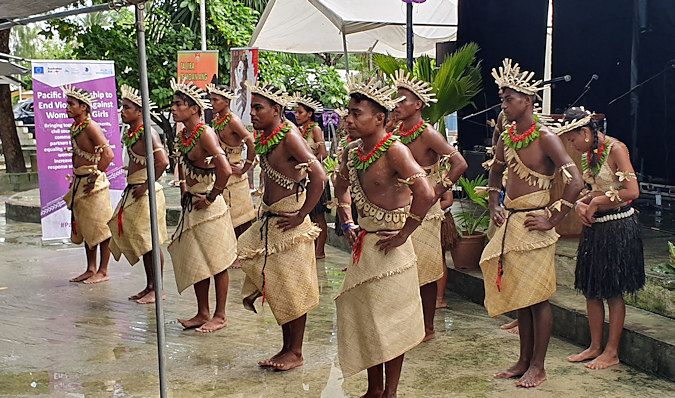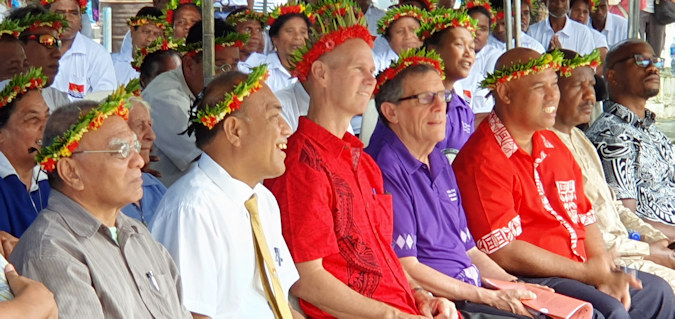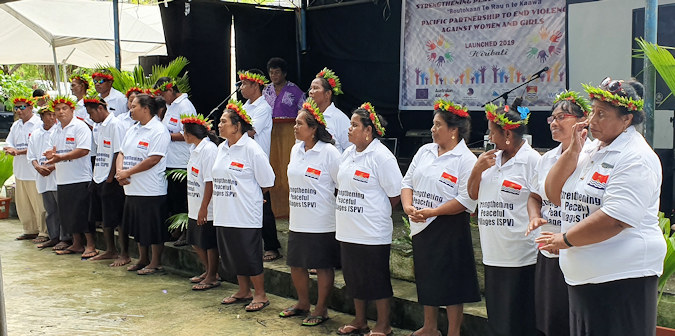Kiribati launch of the new Pacific Partnership to End Violence Against Women and Girls
Date:

[Joint Media Release]
Tarawa, Kiribati – The new Pacific Partnership to End Violence Against Women and Girls (Pacific Partnership) programme was launched nationally in Tarawa today by the President of the Republic of Kiribati, His Excellency Taneti Maamau.
Kiribati is a focus country for the regional EUR19.5million Pacific Partnership programme funded primarily by the European Union (EUR12.7m) with targeted support from the Australian Government (EUR6.2m) and cost-sharing from UN Women (EUR0.6m).

The Pacific Partnership marks a continuation of support by donor and technical partners for initiatives that support survivors of gender-based violence (GBV) in Kiribati, with 68 per cent1 of the nation’s women experiencing physical or sexual intimate partner violence -- twice the global average.
His Excellency Taneti Maamau, President of the Republic of Kiribati said: “The Government of Kiribati is thankful and pleased to welcome this programme and to work together with the Pacific Partnership to End Violence Against Women and Girls.”
“This launching signifies our commitment and real interest to work with the Pacific Partnership toward ending and eliminating any forms of violence against I-Kiribati women and girls.”
“While the Pacific Partnership is new, the support from its partners to the Government of Kiribati and civil society has existed for many years. “This expands our long-term and valuable collaboration to promote gender equality and to promote safe and peaceful families, homes and villages. We thank our development partners, the European Union and Australian Government, and partners of the Pacific Partnership programme for their precious support in providing financial assistance on this new Pacific Partnership.”
“We believe that being a priority country in this Pacific Partnership reflects the national commitments and groundswell of support by the Government of Kiribati and stakeholders to make our nation a place where domestic violence is not tolerated and is rejected by everyone in our communities.”
“This aligns well with our long term vision known as Kiribati Vision for 20 years where one of its primary goals is to make Kiribati a peaceful country by 2036.”

The Pacific Partnership brings together government, civil society organisations, communities and other partners to promote gender equality, prevent violence against women and girls (VAWG), and increase access to quality response services for survivors. The programme will build on the many years of VAWG work by civil society and government in Kiribati to address this issue.
The Head of Cooperation at the EU Delegation for the Pacific, Christoph Wagner, in a video-cross from Suva to Tarawa during the launch, said: “The European Union continues to strive for continued engagement on gender equality with partner countries worldwide. In the Pacific we are staunch advocates and provide funding for Gender equality in different fields, as part of the implementation of the Sustainable Development Goals.”
“Today, we re-affirm our commitment to the promotion, protection and fulfilment of the right of every woman and girl child to have full control over and decide freely on matters related directly to their sexuality and sexual and reproductive health, free from discrimination, coercion and violence. The EU remains strongly committed to implement actions fighting all forms of violence against women and girls. Women and girls need to have equal access to services, education and economic empowerment, and the opportunities to shape their own future,'' Mr Wagner said.
Speaking at the launch in Tarawa, His Excellency the Australian High Commissioner for Kiribati, Mr Bruce Cowled, highlighted Australia’s broad and enduring support, through targeted financial and technical assistance to both MWYSA and UN Women, to end violence against women and girls.

“Australia is pleased to partner with EU, PIFS, SPC and UN Women to support ending violence against women and girls in our region and I thank all partners here today for their involvement in this new initiative,” Mr Cowled said.
The Pacific Partnership has three components – all being implemented in Kiribati - jointly coordinated by the Pacific Community (SPC) Regional Rights Resource Team (RRRT), Pacific Islands Forum Secretariat (PIFS) and UN Women Fiji Multi-Country Office (MCO). Key initiatives in Kiribati under the Pacific Partnership include:
- PIFS to support civil society organisation (CSO) led initiatives, through building their capacity to monitor regional institutions’ and governments’ commitments to gender equality and prevention of violence against women and the participation and engagement of CSOs in regional policy space.
- SPC RRRT is partnering with Kiribati’s Ministry of Education to progress the integration of Social Citizenship Education into the Moral Education, Social Studies and Health Education school curricula (Years 5-8), and also the Social Science curriculum (Years 9-10).
- UN Women is partnering with MWYSSA to prevent and respond to violence against women and girls. This includes the implementation and research of the Strengthening Peaceful Villages (SPV) programme which engages local community members to take action to prevent and respond to violence in their communities; support to the national Domestic Violence Counselling Framework; and to SafeNet to strengthen services, referrals and coordination for the best services for women and families affected by violence.
- UN Women, in partnership with the Fiji Women’s Crisis Centre, is also supporting the recently established Kiribati Women and Children Support Centre (KWCSC) to provide high quality, combined counselling and case management services to GBV survivors, with broader plans to expand services beyond Tarawa to provide outreach support to outer islands.
In addition to Kiribati, the five-year programme (2018-2022) targets countries and territories in the Pacific region including, but not limited to, Fiji, Papua New Guinea, Republic of the Marshall Islands, Samoa, Solomon Islands, Tonga, Tuvalu, and Vanuatu.
Resources:
1Findings from the Family Health and Safety Studies (FHSS), conducted by UNFPA and the Pacific Community (SPC) across 11 Pacific countries are online, including Kiribati: https://pacific.unfpa.org/en/publications/kiribati-family-health-and-safety-study
Media enquiries should be directed to:
- Office of the Beretitenti (President), Mr. Tearinibeia Teabo - Senior Communications Officer, Mobile: 73048667 or Email: tteabo@ob.gov.ki
- UN Women, Jacqui Berrell – Strategic Communications Specialist, Ph: Kiribati: +686 7305 0347 Email: jacqui.berrell@unwomen.org
- Australian High Commission in Kiribati, Rimon Rimon - Public Diplomacy & Communications Manager, Ph: +686 740-21184 or Mobile 720-41117 or email: Rimon, Rimon [ Click to reveal ] (or for regional media: Dawn Gibson, Email: Dawn.Gibson@dfat.gov.au)
- European Union (EU), Ph: +679 3313 633, Kamni Narayan, Kamni.NARAYAN@eeas.europa.eu, ext 115 or Mohammed-Nazeem Kasim, Mohammed-Nazeem.KASIM@eeas.europa.eu Mobile: +679 9920 597
BACKGROUND:
The Pacific region has some of the highest rates of violence against women recorded in the world – twice the global average with an estimated two in every three Pacific women impacted by gender-based violence. Along with high rates of violence – a violation of human rights – women and girls in the Pacific region experience constant and continual inequalities including low levels of participation in decision making, limited economic opportunities, restricted access to rights.
The Pacific Partnership to End Violence Against Women and Girls (Pacific Partnership) brings together governments, civil society organisations, communities and other partners to promote gender equality, prevent violence against women and girls (VAWG), and increase access to quality response services for survivors.
To achieve this, the Pacific Partnership aims to transform the social norms that allow violence against women and girls to continue; to ensure survivors have access to quality response services; and to support national and regional institutions to meet their commitments to gender equality and prevention of violence against women and girls. Working through partners, it will promote equal rights and opportunities for all Pacific people, through innovative approaches to education, access to essential services, and policy development.
The EUR 19.5million partnership is funded primarily by the European Union (EUR 12.7m) that supports all three outcome areas of the programme, with the Australian Government providing targeted funding to the second outcome (EUR 6.2m or AUD 7.6m) with cost-sharing from UN Women (EUR 0.6m or USD 0.75m). Australia is the leading partner in Kiribati. The programme’s three outcome areas are jointly implemented through a partnership between the Pacific Community (SPC) Regional Rights Resource Team (RRRT), Pacific Islands Forum Secretariat (Forum Secretariat) and UN Women Fiji Multi-Country Office (MCO).
The three key outcomes, or components, are:
- A key outcome of the programme aims to enhance Pacific youth’s formal in-school and informal education on gender equality and prevention of violence against women and girls. This outcome is funded by the European Union (EU) and led by SPC RRRT.
- A key outcome of the programme aims to promote gender equitable social norms at individual and community levels to prevent violence against women and girls, and to ensure survivors have access to quality response services. This outcome is funded by the European Union (EU) and Australian Government with support from the UN Women Fiji MCO that is also the coordinating agency.
- A key outcome of the programme focuses on empowering national and regional civil society organisations (CSOs) to advocate, monitor and report on regional institutions and governments commitments to enhance gender equality and prevent violence against women and girls. This outcome is funded by the EU and implemented by the Forum Secretariat.
The five-year programme (2018-2022) targets countries and territories in the Pacific region including, but not limited to, Fiji, Kiribati, Papua New Guinea, Republic of the Marshall Islands, Samoa, Kiribati, Tonga, Tuvalu and Vanuatu.